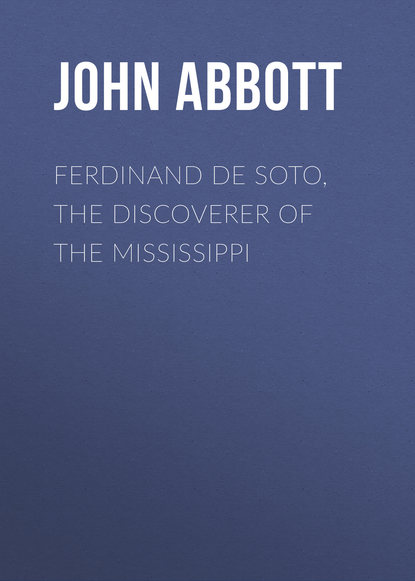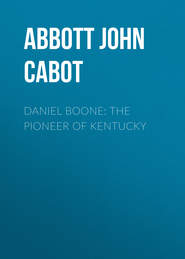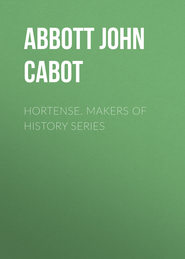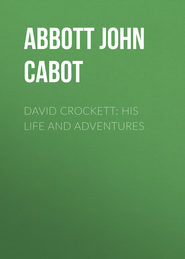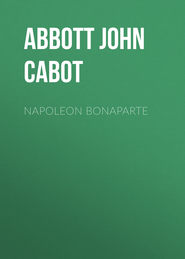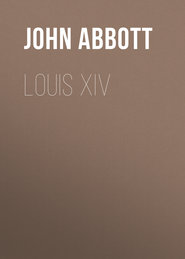По всем вопросам обращайтесь на: info@litportal.ru
(©) 2003-2024.
✖
Ferdinand De Soto, The Discoverer of the Mississippi
Настройки чтения
Размер шрифта
Высота строк
Поля
Of the three brothers who reigned over this extended territory the elder bore the same name with the province which he governed, which was Vitachuco. He was far the most powerful of the three, in both the extent and populousness of his domain. His two brothers had united in sending an embassy to him, earnestly enjoining the expediency of cultivating friendly relations with the Spaniards. The following very extraordinary reply, which he returned, is given by Garcilaso de la Vega. And though he says he quotes from memory, still he pledges his word of honor, that it is a truthful record of the message Vitachuco sent back. We read it with wonder, as it indicates a degree of mental enlightenment, which we had not supposed could have been found among those semi-civilized people.
"It is evident," said the chief to his brothers, "that you are young and have neither judgment nor experience, or you would never speak as you have done of these hated white men. You extol them as virtuous men, who injure no one. You say that they are valiant; are children of the Sun, and merit all our reverence and service. The vile chains which they have hung upon you, and the mean and dastardly spirit which you have acquired during the short period you have been their slaves, have caused you to speak like women, lauding what you should censure and abhor.
"You remember not that these strangers can be no better than those who formerly committed so many cruelties in our country. Are they not of the same nation and subject to the same laws? Do not their manner of life and actions prove them to be the children of the spirit of evil, and not of the Sun and Moon – our Gods? Go they not from land to land plundering and destroying; taking the wives and daughters of others instead of bringing their own with them; and like mere vagabonds maintaining themselves by the laborious toil and sweating brow of others!
"Were they virtuous, as you represent, they never would have left their own country; since there they might have practised their virtues; planting and cultivating the earth, maintaining themselves, without prejudice to others or injury to themselves, instead of roving about the world, committing robberies and murders, having neither the shame of men nor the fear of God before them. Warn them not to enter into my dominions. Valiant as they may be, if they dare to put foot upon my soil, they shall never go out of my land alive."
De Soto and his army remained eight days at Ochile. By unwearied kindness, he so won the confidence of the two brother chiefs, that they went in person to Vitachuco to endeavor by their united representations to win him to friendly relations with the Spaniards. Apparently they succeeded. Vitachuco either became really convinced that he had misjudged the strangers, or feigned reconciliation. He invited De Soto and his army to visit his territory, assigning to them an encampment in a rich and blooming valley. On an appointed day the chief advanced to meet them, accompanied by his two brothers and five hundred warriors, in the richest decorations and best armament of military art as then understood by the Floridians.
De Soto and Vitachuco were about of the same age and alike magnificent specimens of physical manhood. The meeting between them was as cordial as if they had always been friends. The Indian warriors escorted their guests from their encampment to the capital. It consisted of two hundred spacious edifices, strongly built of hewn timber. Several days were passed in feasting and rejoicing, when Juan Ortiz informed the governor that some friendly Indians had revealed to him that a plot had been formed, by Vitachuco, for the entire destruction of the Spanish army.
The chief was to assemble his warriors, to the number of about ten thousand, upon an extensive plain, just outside the city, ostensibly to gratify De Soto with the splendors of a peaceable parade. To disarm all suspicion, they were to appear without any weapons of war, which weapons were however previously to be concealed in the long grass of the prairie. De Soto was to be invited to walk out with the chief to witness the spectacle. Twelve very powerful Indians, with concealed arms, were to accompany the chief or to be near at hand. It was supposed that the pageant would call out nearly all the Spaniards, and that they would be carelessly sauntering over the plain. At a given signal, the twelve Indians were to rush upon De Soto, and take him captive if possible, or if it were inevitable, put him to death.
At the same moment the whole band of native warriors, grasping their arms, was to rush upon the Spaniards in overpowering numbers of ten to one. In this way it was supposed that every man could speedily be put to death or captured. Those who were taken prisoners were to be exposed to the utmost ingenuity of Indian torture.
This seemed a very plausible story. De Soto, upon careful inquiry, became satisfied of its truth. He consulted his captains, and decided to be so prepared for the emergence, that should he be thus attacked, the Indian chief would fall into the trap which he had prepared for his victims.
The designated day arrived. The sun rose in a cloudless sky and a gentle breeze swept the prairie. Early in the morning, Vitachuco called upon De Soto, and very obsequiously solicited him to confer upon him the honor of witnessing a grand muster of his subjects. He said they would appear entirely unarmed, but he wished De Soto to witness their evolutions, that he might compare them with the military drill of European armies. De Soto, assuming a very friendly and unsuspicious air, assured the chief, that he should be very happy to witness the pageant. And to add to its imposing display, and in his turn to do something to interest the natives, he said he would call out his whole force of infantry and cavalry, and arrange them in full battle array on the opposite side of the plain.
The chief was evidently much embarrassed by this proposition, but he did not venture to present any obstacles. Knowing the valor and ferocity of his troops, he still thought that with De Soto as his captive, he could crush the Spaniards by overwhelming numbers. Matters being thus arranged, the whole Spanish army, in its most glittering array, defiled upon the plain. De Soto was secretly well armed. Servants were ready with two of the finest horses to rush to his aid. A body-guard of twelve of his most stalwart men loitered carelessly around him.
At nine o'clock in the morning, De Soto and Vitachuco walked out, side by side, accompanied by their few attendants and ascended a slight eminence which commanded a view of the field. Notwithstanding the careless air assumed by De Soto, he was watching every movement of Vitachuco with intensest interest. The instant the Indian chief gave his signal, his attendants rushed upon De Soto, and his ten thousand warriors grasped their arrows and javelins, and with the hideous war-whoop rushed upon the Spaniards. But at the same instant a bugle blast, echoing over the plain, put the whole Spanish army in motion in an impetuous charge. The two signals for the deadly conflict seemed to be simultaneous. The body-guard of De Soto, with their far superior weapons, not only repelled the Indian assailants, but seized and bound Vitachuco as their captive. De Soto lost not a moment in mounting a horse, led to him by his servant. But the noble animal fell dead beneath him, pierced by many arrows. Another steed was instantly at his side, and De Soto was at the head of his cavalry, leading the charge. Never, perhaps, before, did so terrible a storm burst thus suddenly from so serene a sky.
The natives fought with valor and ferocity which could not be surpassed even by the Spaniards. All the day long the sanguinary battle raged, until terminated by the darkness of the night. The field was bordered, on one side, by a dense forest, and on the other by a large body of water, consisting of two lakes. Some of the natives escaped into the almost impenetrable forest. Many were drowned. Several of the young men, but eighteen years of age, who were taken captive, – the sons of chiefs, – developed a heroism of character which attracted the highest admiration of De Soto. They fought to the last possible moment, and when finally captured, expressed great regret that they had not been able to die for their country. They said to their conqueror,
"If you wish to add to your favors, take our lives. After surviving the defeat and capture of our chieftain, we are not worthy to appear before him, or to live in the world."
It is said that De Soto was greatly moved with compassion in view of the calamity which had befallen these noble young men. He embraced them with parental tenderness, and commended their valor, which he regarded as proof of their noble blood.
"For two days," writes Mr. Irving, "he detained them in the camp, feasting them at his table and treating them with every distinction; at the end of which time he dismissed them with presents of linen, cloths, silks, mirrors and other articles of Spanish manufacture. He also sent by them presents to their fathers and relations, with proffers of friendship."
De Soto had succeeded in capturing four of the most distinguished captains of Vitachuco. They had been ostensibly the friends of the Spaniard, had ate at his table and had apparently reciprocated all his kindly words and deeds. While thus deceiving him, they had coöperated with Vitachuco for his destruction. De Soto summoned them with their chief before him.
"He reproached them," says Mr. Irving "with the treacherous and murderous plot, devised against him and his soldiers, at a time when they were professing the kindest amity. Such treason, he observed, merited death; yet he wished to give the natives evidence of his clemency. He pardoned them, therefore, and restored them to his friendship; warning them, however, to beware how they again deceived him, or trespassed against the safety and welfare of the Spaniards, lest they should bring down upon themselves dire and terrible revenge."
Vitachuco was now a captive. Yet notwithstanding the conspiracy which had led to such deplorable results, De Soto treated him with great kindness, giving him a seat at his own table, and endeavoring in all ways to obliterate the remembrance of the conflict. De Soto was in search of gold. He had heard of mountains of that precious metal far away in the interior. The natives had no wealth which he desired to plunder. Their hostility he exceedingly deprecated, as it deprived him of food, of comforts, and exposed his little band to the danger of being cut off and annihilated, as were the troops of Narvaez, who had preceded him. The past career of De Soto proves, conclusively, that he was by nature a humane man, loving what he conceived to be justice.
Under these circumstances, a wise policy demanded that he should do what he could to conciliate the natives before he advanced in his adventurous journey, leaving them, if hostile, disposed to cut off his return. It is said that nine hundred of the most distinguished warriors of Vitachuco were virtually enslaved, one of whom was assigned to each of the Spaniards, to serve him in the camp and at the table. Such at least is the story as it comes down to us. Vitachuco formed the plan again to assail the Spaniards by a concerted action at the dinner-table. Every warrior was to be ready to surprise and seize his master, and put him to death. There is much in this narrative which seems improbable. We will, however, give it to our readers as recorded by Mr. Irving in his very carefully written history of the Conquest of Florida. We know not how it can be presented in a more impartial manner.
"Scarcely had Vitachuco conceived this rash scheme than he hastened to put it into operation. He had four young Indians to attend him as pages. These he sent to the principal prisoners, revealing his plan, with orders that they should pass it secretly and adroitly from one to another, and hold themselves in readiness, at the appointed time, to carry it into effect. The dinner hour of the third day was the time fixed upon for striking the blow. Vitachuco would be dining with the governor, and the Indians in general attending upon their respective masters.
"The cacique was to watch his opportunity, spring upon the governor and kill him, giving at the moment of assault a war-whoop which should resound throughout the village. The war-whoop was to be the signal for every Indian to grapple with his master or with any other Spaniard at hand and dispatch him on the spot.
"On the day appointed Vitachuco dined as usual with the governor. When the repast was concluded, he sprang upon his feet, closed instantly with the governor, seized him with the left hand by the collar, and with the other fist dealt him such a blow in the face as to level him with the ground, the blood gushing out of eyes, nose and mouth. The cacique threw himself upon his victim to finish his work, giving at the same time his signal war-whoop.
"All this was the work of an instant; and before the officers present had time to recover from their astonishment, the governor lay senseless beneath the tiger grasp of Vitachuco. One more blow from the savage would have been fatal; but before he could give it a dozen swords and lances were thrust through his body, and he fell dead.
"The war-whoop had resounded through the village. Hearing the fatal signal, the Indians, attending upon their masters, assailed them with whatever missile they could command. Some seized upon pikes and swords; others snatched up the pots in which meal was stewing at the fire, and beating the Spaniards about the head, bruised and scalded them at the same time. Some caught up plates, pitchers, jars, and the pestles wherewith they pounded the maize. Others seized upon stools, benches and tables, striking with impotent fury, when their weapons had not the power to harm. Others snatched up burning fire-brands, and rushed like very devils into the affray. Many of the Spaniards were terribly burned, bruised and scalded. Some had their arms broken."
This terrible conflict was of short duration. Though the Spaniards were taken by surprise, they were not unarmed. Their long keen sabres gave them a great advantage over their assailants. Though several were slain, and many more severely wounded, the natives were soon overpowered. The exasperated Spaniards were not disposed to show much mercy. In these two conflicts with the Indians, Vitachuco fell, and thirteen hundred of his ablest warriors.
De Soto had received so terrific a blow, that for half an hour he remained insensible. The gigantic fist of the savage had awfully bruised his face, knocking out several of his teeth. It was four days before he recovered sufficient strength to continue his march and twenty days elapsed before he could take any solid food. On the fifth day after this great disaster the Spaniards resumed their journeyings in a northwest direction, in search of a province of which they had heard favorable accounts, called Osachile. The first day they advanced but about twelve miles, encamping upon the banks of a broad and deep river, which is supposed to have been the Suwanee.
A band of Indians was upon the opposite side of the stream evidently in hostile array. The Spaniards spent a day and a half in constructing rafts to float them across. They approached the shore in such strength, that the Indians took to flight, without assailing them. Having crossed the river they entered upon a prairie country of fertile soil, where the industrious Indians had many fields well filled with corn, beans and pumpkins. But as they journeyed on, the Indians, in small bands, assailed them at every point from which an unseen arrow or javelin could be thrown. The Spaniards, on their march, kept in quite a compact body, numbering seven or eight hundred men, several hundred of whom were mounted on horses gayly caparisoned, which animals, be it remembered, the Indians had never before seen.
After proceeding about thirty miles through a pretty well cultivated country, with scattered farm-houses, they came to quite an important Indian town called Osachile. It contained about two hundred houses; but the terrified inhabitants had fled, taking with them their most valuable effects, and utter solitude reigned in its streets.
The country was generally flat, though occasionally it assumed a little of the character of what is called the rolling prairie. The Indian towns were always built upon some gentle swell of land. Where this could not be found, they often constructed artificial mounds of earth, sufficient in extent to contain from ten to twenty houses. Upon one of these the chief and his immediate attendants would rear their dwellings, while the more humble abodes of the common people, were clustered around. At Osachile De Soto found an ample supply of provisions, and he remained there two days.
It is supposed that Osachile was at the point now called Old Town. Here De Soto was informed by captive Indians that about thirty leagues to the west there was a very rich and populous country called Appalachee. The natives were warlike in the highest degree, spreading the terror of their name through all the region around. Gold was said to abound there. The country to be passed through, before reaching that territory, was filled with gloomy swamps and impenetrable thickets, where there was opportunity for ambuscades. De Soto was told that the Appalachians would certainly destroy his whole army should he attempt to pass through those barriers and enter their borders.
This peril was only an incentive to the adventurous spirit of the Spanish commander. To abandon the enterprise and return without the gold, would be not only humiliating, but would be his utter ruin. He had already expended in the undertaking all that he possessed. He had no scruples of conscience to retard his march, however sanguinary the hostility of the natives might render it. It was the doctrine of the so-called church at Rome, that Christians were entitled to the possessions of the heathen; and though De Soto himself by no means professed to be actuated by that motive, the principle unquestionably influenced nearly his whole army.
But he did assume that he was a peaceful traveller, desiring to cultivate only friendly relations with the natives, and that he had a right to explore this wilderness of the new world in search of those precious medals of which the natives knew not the value, but which were of so much importance to the interest of all civilized nations.
For three days the Spaniards toiled painfully along over an arid, desert plain, beneath a burning sun. About noon on the fourth day they reached a vast swamp, probably near the Estauhatchee river. This swamp was bordered by a gloomy forest, with gigantic trees, and a dense, impervious underbrush, ever stimulated to wonderful luxuriance by an almost tropical sun and a moist and spongy soil. Through this morass the Indians, during generations long since passed away, had constructed a narrow trail or path about three feet wide. This passage, on both sides, was walled up by thorny and entangled vegetation almost as impenetrable as if it were brick or stone.
In the centre of this gloomy forest, there was a sheet of shallow water about a mile and a half in width and extending north and south as far as the eye could reach. The Indians had discovered a ford across this lake till they came to the main channel in the centre, which was about one hundred and twenty feet wide. This channel, in the motionless waters, was passed by a rude bridge consisting of trees tied together.
De Soto encamped on the borders of this gloomy region for a short time to become acquainted with the route and to force the passage. There were various spots where the Indians, familiar with the whole region, lay in ambush. From their unseen coverts, they could assail the Spaniards with a shower of arrows as they defiled through the narrow pass, and escape beyond any possibility of pursuit. Compelling some Indians to operate as guides, under penalty of being torn to pieces by bloodhounds, De Soto commenced his march just after midnight. Two hundred picked men on foot, but carefully encased in armor, led the advance in a long line two abreast. Every man was furnished with his day's allowance of food in the form of roasted kernels of corn. They pressed along through a path which they could not lose, and from which they could not wander, till they reached the lake. Here the guides led them along by a narrow ford, up to their waists in water, till they reached the bridge of logs. The advance-guard had just passed over this bridge when the day dawned, and they were discovered by the Indians, who had not supposed they would attempt to cross the morass by night.
The Appalachian warriors, with hideous yells and great bravery, rushed into the lake to meet their foes. Here Spaniard and Floridian grappled in the death struggle up to their waists in water. The steel-clad Spaniards, with their superior arms, prevailed, and the natives repulsed, rushed into the narrow defile upon the other side of the lake. The main body of the army pressed on, though continually and fiercely assailed by the arrows of the Indians. Arriving at a point where there was an expanse of tolerably dry ground, De Soto sent into the forests around forty skirmishers to keep off the Indians, while a hundred and fifty men were employed in felling trees and burning brush, in preparation for an encampment for the night.
Exhausted by the toil of the march and of the battle; drenched with the waters of the lake; many of them suffering from wounds, they threw themselves down upon the hot and smouldering soil for sleep. But there was no repose for them that night. During all the hours of darkness, the prowling natives kept up a continuous clamor, with ever recurring assaults. With the first dawn of the morning the Spaniards resumed their march, anxious to get out of the defile and into the open prairie beyond, where they could avail themselves of their horses, of which the Indians stood in great dread. As they gradually emerged from the impenetrable thicket into the more open forest, the army could be spread out more effectually, and the horsesmen could be brought a little more into action. But here the valor of the natives did not forsake them.
"As soon as the Spaniards," writes Mr. Irving, "entered this more open woodland, they were assailed by showers of arrows on every side. The Indians, scattered about among the thickets, sallied forth, plied their bows with intense rapidity, and plunged again into the forest. The horses were of no avail. The arquebusiers and archers seemed no longer a terror; for in the time a Spaniard could make one discharge, and reload his musket or place another bolt in his cross-bow, an Indian would launch six or seven arrows. Scarce had one arrow taken flight before another was in the bow. For two long leagues did the Spaniards toil and fight their way forward through this forest.
"Irritated and mortified by these galling attacks and the impossibility of retaliating, at length they emerged into an open and level country. Here, overjoyed at being freed from this forest prison, they gave reins to their horses, and free vent to their smothered rage, and scoured the plain, lancing and cutting down every Indian they encountered. But few of the enemy were taken prisoners, many were put to the sword."
CHAPTER XII
Winter Quarters
Incidents of the March. – Passage of the River. – Entering Anhayea. – Exploring Expeditions. – De Soto's desire for Peace. – Capture of Capafi. – His Escape. – Embarrassments of De Soto. – Letter of Isabella. – Exploration of the Coast. – Discovery of the Bay of Pensacola. – Testimony Respecting Cafachiqué. – The March Resumed.
The Spaniards now entered upon a beautiful and highly cultivated region, waving with fields of corn and adorned with many pleasant villages and scattered farm-houses. It seemed to be the abode of peace, plenty and happiness. It certainly might have been such, but for the wickedness of man. Wearied with their long march and almost incessant battle, the Spaniards encamped in the open plain, where their horsemen would be able to beat off assaults.
But the night brought them no repose. It was necessary to keep a large force mounted and ready for conflict. The natives, in large numbers, surrounded them, menacing an attack from every quarter, repeatedly drawing near enough in the darkness to throw their arrows into the camp, and keeping up an incessant and hideous howling. After a sleepless night, with the earliest light of the morning they resumed their march along a very comfortable road, which led through extensive fields of corn, beans, pumpkins and other vegetables. The prairie spread out before them in its beautiful, level expanse, till lost in the distant horizon. All the day long their march was harassed by bands of natives springing up from ambush in the dense corn-fields which effectually concealed them from view. Many were the bloody conflicts in which the natives were cut down mercilessly, and still their ferocity and boldness continued unabated.
After thus toiling on for six miles the Spaniards approached a deep stream, supposed to be the river Uche. It was crossed by a narrow ford with deep water above and below. Here the natives had constructed palisades, and interposed other obstacles, behind which, with their arrows and javelins, they seemed prepared to make a desperate resistance. De Soto, after carefully reconnoitering the position, selected a number of horsemen, who were most effectually protected with their steel armor, and sent them forward, with shields on one arm, and with swords and hatchets to hew away these obstructions, which were all composed of wood. Though several of the Spaniards were slain and many wounded, they effected a passage, when the mounted horsemen plunged through the opening, put the Indians to flight and cut them down with great slaughter.
Continuing their march, on the other side of the river, for a distance of about six miles through the same fertile and well populated region, they were admonished by the approach of night, again to seek an encampment. The night was dark and gloomy. All were deeply depressed in spirits. An incessant battle seemed their destiny. The golden mountains of which they were in pursuit were ever vanishing away. They were on the same path which had previously been traversed by the cruel but energetic Narvaez, and where his whole company had been annihilated, leaving but four or five to tell the tale of the awful tragedy.
Dreadful as were the woes which these adventurers had brought upon the Indians, still more terrible were the calamities in which they had involved themselves. They were now three hundred miles from Tampa Bay. Loud murmurs began to rise in the camp. Nearly all demanded to return. But, for De Soto, the abandonment of the enterprise was disgrace, and apparently irretrievable ruin. There was scarcely any condition of life more to be deplored than that of an impoverished nobleman. De Soto was therefore urged onward by the energies of despair.
Again through all the hours of the night, they were exposed to an incessant assault from their unwearied foes. From their captives they learned that they were but six miles from the village of Anhayea, where their chief, Capafi, resided. This was the first instance in which they heard of a chief who did not bear the same name as the town in which he dwelt. Early in the morning, De Soto, with two hundred mounted cavaliers and one hundred footmen, led the advance, and soon entered the village, which consisted of two hundred and fifty houses, well built and of large size.
At one end of the village stood the dwelling of the chief, which was quite imposing in extent, though not in the grandeur of its architecture. The chief and all his men had fled, and the Spaniards entered deserted streets. The army remained here for several days, finding abundance of food. Still they were harassed, day and night, by the indomitable energy of the natives. Two well armed expeditions were sent out to explore the country on the north and the west, for a distance of forty or fifty miles, while a third was dispatched to the south in search of the ocean.





